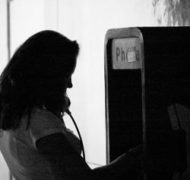Unwanted Transitions: Finding Normal after Loss
Blog / Produced by The High Calling
On Thanksgiving morning, I was chatting in my friend’s kitchen as she sautéed onions and celery for the dressing. We discussed which Pepperidge Farm stuffing mix to dump in—the cornbread or the savory white bread cubes. I live in cornbread dressing country now, but my people used white bread, Nickles white bread, from the family-owned industrial bakery where my father worked. The savory, I say, and she agrees.
As she dumps in the mix, I’m back in that family kitchen of my youth, seeing the bread laid out in a low-heat oven to dry out, then seeing the cut-up chunks mixed together in the giant white Tupperware bowl with sautéed onions and celery, and I think butter, and chicken broth, and sage, and … what else?
I wanted to call Dad and ask how we made our dressing. But I can’t.
*****
The phone rings on a Friday morning, and simultaneously, my heart leaps and my gut sinks.
For six years, my dad and I had weekly phone dates. For four years, we talked on Friday mornings, ever since my work schedule changed and I had Fridays off. There are no more weekly phone dates. Dad died in August.
My mother died 24 years ago, and I still sometimes experience that phenomenon where I want to ask her something and, for a nanosecond, think about calling her, and then remember.
Dad and I lived 900 miles apart. We saw each other once, maybe twice a year. My day-to-day life is not much different than it was before he was diagnosed with lung cancer a year ago. But the dying of a parent is always a transition, one less generational layer between us and the inevitability of death.
What I am noticing so far, in this grief that is still new, in this world without Dad, is the loss of what he knew. All the things about which there’s no one to ask.
The neighbor who lived across the street from our back porch comes up in conversation. What did her husband do? someone asks. I remember her only as a widow. Dad would have known something about Mr. Menkemiller, if there was a Mr. Menkemiller. Dad would have known their first names, too.
The “check engine” light comes on in my car, and the guys at Auto Zone do their free diagnostic and tell me it’s the air-intake-something. The salesman shows me where it is and says it might just be gunked up and I can spray this stuff on it and let it sit and dry. But that’s more car maintenance than I’m comfortable with. Dad would know whether this was something that needed to be fixed right away or something I could drive with for a while.
Not a week goes by that I don’t have this thought: Dad would know. Next time I talk to Dad, I’ll ask …
There are unexpected gifts, too, though, that dim the ache a little.
At a family Christmas gathering, we are sampling the sugar cookies made by my stepmother’s sister, who has known me since I was a teenager and who surely prayed for me in the years I didn’t get along so well with Dad. She tells me a story he told her. The first Christmas after Mom died, I was trying to uphold her tradition of making cookies. I didn’t pay attention to the part of the recipe that said to brush the sugar cookies with beaten egg before baking to help the sprinkles adhere.
I felt tender toward Dad hearing that story, knowing that he would not directly remind me of that embarrassment. And I’m glad that he told her, so she could tell me —without judgment, with maybe just a tinge of teasing, which is, I have come to understand, a form of love.
And still on the voicemail of my cell phone, there are messages that came on some Friday morning in the past four years, that begin, “This is your daddy …”
*****
The Pepperidge Farm dressing wasn’t quite the flavor in my mind. (My friend left out the step where you put some in the brown stoneware bowl and bake it so the top gets a little crusty.) I consulted the other curator of family memories, my brother. He doesn’t remember the recipe any more than I do.
What remains is the savory seasoning of memory. I ate two helpings, and took even more home in one of the plastic containers she’d told me to bring for leftovers.
:::
EDITOR’S NOTE: This week at The High Calling, we’re focusing on transitions in the workplace, home, and community. Are you experiencing change in your life? Join us each day this week for articles, interviews, and reflections on thriving in transition. Or, do you know someone who is going through a transition right now? Encourage them by sharing one of this week’s articles via email or social media.
Laura Lynn Brown works at a newspaper in Little Rock, Ark., and as a freelance writer and editor. Her book, Everything That Makes You Mom: A Bouquet of Memories, was published in 2013 by Abingdon Press. She likes to commit random acts of singing.
Image by Brian Auer. Used with permission. Sourced via Flickr.





